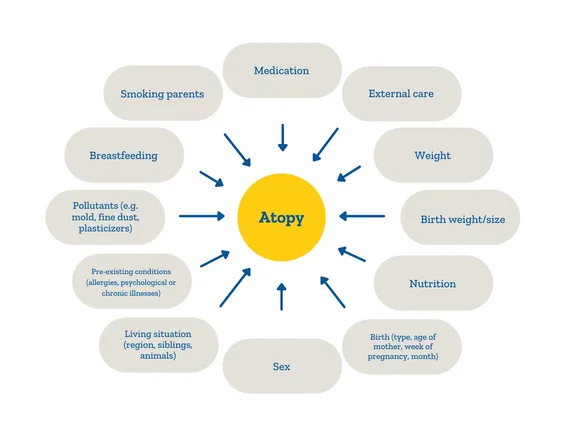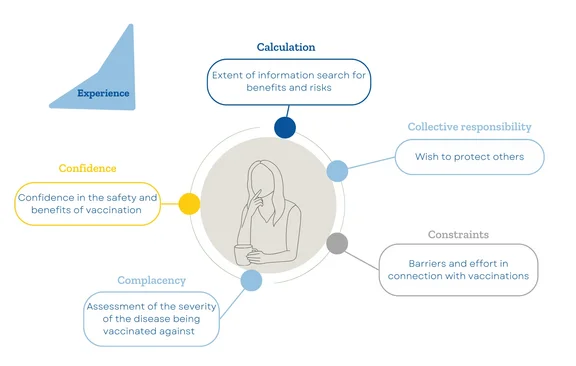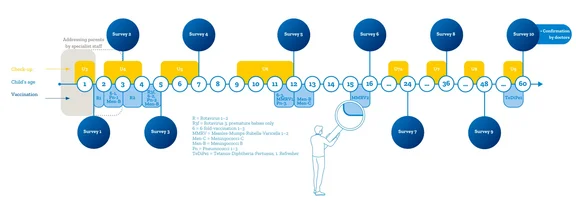Influence of vaccinations in the first year of life on the development of allergies
According to the World Health Organisation (WHO), vaccine hesitancy is one of the ten greatest health threats worldwide (World Health Organization [WHO], 2019), as vaccinations are among the greatest advances in public health (Centers for Disease Control and Prevention [CDC], 2011). Their influence on the prevention of various diseases is considered to be very high, so that even infants are advised to be immunised against a variety of diseases (Whitney, Zhou, Singleton & Schuchat, 2014).
The Standing Committee on Vaccination (STIKO) recommends up to 14 doses of immunisation against the same number of pathogens for the first year of life. These are often multiple vaccines designed to protect against up to six pathogens (Robert Koch Institute, 2024). The recommendations for vaccination dates vary in different European countries; not all parents adhere to the vaccination schedule recommended in Germany either. It is unclear what impact delayed vaccinations have on children's health development (ECDC, 2024).
Influencing factors
In recent decades, people have increasingly developed allergies. The list of possible influencing factors is long. The influence that different vaccinations can have on allergy development is contradicted by the current study situation: while some studies see a reduction in allergic diseases in addition to the protective effect against disease, other studies observe the opposite (Bernsen et al., 2008; Timmermann et al., 2015; Jensen, Andersen and Stensballe, 2019; Hooker and Miller, 2020).
Therefore, it is currently not possible to make any statements about the influence of different vaccination dates and vaccinations on the development of atopic diseases (Navaratna et al., 2021). The reasons for this inconsistency could be different vaccines, vaccination dates or, as the comparison with other countries shows, different vaccination strategies. These have also not yet been researched. The selected study designs are all retrospective and often only look at a short period after vaccination (Nilsson et al., 2017). In order to obtain as comprehensive a view as possible of the children's health, in the INITIAL study we also enquired about all other illnesses in addition to atopic diseases, so that indications of other effects can also be determined.

Influences on allergy development
On this basis, the question "What influence do vaccinations in the first year of life have on the development of allergic dermatitis, bronchial asthma, hay fever or food allergies?" will be investigated.
Vaccination counselling
Shortly after the birth of a child, parents are confronted with the vaccination decision, as the first vaccination is recommended at six weeks of age. The decision can be difficult for parents, especially if they are aware of different vaccination strategies or have had experiences with vaccinating and not vaccinating. Trust is of great importance here: trust in the vaccination, but also trust in the healthcare professionals who provide information about the vaccination, can have a decisive influence on the vaccination decision (Fu, Zimet, Latkin & Joseph, 2017; Ratz, 2015). Doctors are often the first contact persons in this context. However, vaccination counselling is not remunerated for statutory health insurance physicians; therefore, they are often given little time.
Knowledge about vaccinations can also be an important building block for parents when deciding whether to vaccinate their child. However, it is unclear how information provision and decision-making are linked. In a previous qualitative study, we were able to identify indications that not only knowledge about possible consequences, but also the provision of information can influence the decision and that parents would like independent vaccination counselling (Ratz, 2015).
The fact that a mere increase in knowledge does not lead to a better decision was also shown during the coronavirus pandemic, when the flood of information regarding vaccinations increased. However, vaccinations among children declined (DAK-Gesundheit, 2022).

Influences on the vaccination decision based on the 5C model according to Betsch et al. (2018)
These observations are in contrast to general data from the Federal Centre for Health Education (BZgA) (Horstkötter, N. et al., 2021). According to this survey, 78% of parents of children between the ages of 0 and 13 surveyed are not interested in further information on the subject of vaccination. It was also indicated that parents who are critical of vaccination tend not to want any further information. The proportion of parents wanting information was higher in the 0 - 2 age group than in other age groups.
In order to record the decision-making process and the need for support and counselling, we survey parents before and after the first planned vaccination series. The wishes of parents who are more in favour of vaccinations are compared with those of parents who are more against vaccinations. In addition, we descriptively investigate the influences on the parents' decision-making and the counselling that took place and was desired with regard to the vaccination decision. The survey is embedded in the overall study and takes place using online questionnaires. The survey dates refer to an age of approx. 6 and approx. 12 weeks, which corresponds to the time before and after the first vaccination block recommended in Germany.
Methodological approach
In order to make the best possible contribution to answering this question, the research question is being investigated in the form of a prospective cohort study. Healthcare professionals (e.g. doctors, midwives, social workers) invite expectant parents and parents of children up to the age of six, maximum twelve weeks to take part in the study. The parents then receive online questionnaires at various times up to the age of six, based on the recommended immunisations and check-ups. The content includes the child's health and immunisation status as well as the vaccination attitude and various factors influencing allergy development.
After five years (at the time of the U9), parents can submit a form to the treating paediatrician to confirm or deny the study endpoints allergic dermatitis, bronchial asthma, hay fever or food allergies.
Further information
Sources
Betsch, C., Schmid, P., Heinemeier, D., Korn, L., Holtmann, C. & Böhm, R. (2018). beyond confidence: Development of a measure assessing the 5C psychological antecedents of vaccination. PLoS ONE, 13(12), e0208601. https://doi.org/10.1371/journal.pone.0208601
Bernsen, R. M. D. & van der Wouden, J. C. (2008). Measles, mumps and rubella infections and atopic disorders in MMR-unvaccinated and MMR-vaccinated children. Pediatric Allergy and Immunology : Official Publication of the European Society of Pediatric Allergy and Immunology, 19(6), 544-551. https://doi.org/10.1111/j.1399-3038.2007.00684.x
Centres for Disease Control and Prevention (2011). Ten great public health achievements--worldwide, 2001-2010. MMWR. Morbidity and Mortality Weekly Report, 60(24), 814-818.
European Centre for Disease Prevention and Control (ECDC). (2024). Vaccine schedules in all countries in the EU/EEA. Accessed on 01 .09.2024. Available at: https://vaccine-schedule.ecdc.europa.eu/
Fu, L. Y., Zimet, G. D., Latkin, C. A. & Joseph, J. G. (2017). Associations of trust and healthcare provider advice with HPV vaccine acceptance among African American parents. Vaccine, 35(5), 802-807. https://doi.org/10.1016/j.vaccine.2016.12.045
Hooker, B. S. & Miller, N. Z. (2020). Analysis of health outcomes in vaccinated and unvaccinated children: Developmental delays, asthma, ear infections and gastrointestinal disorders. SAGE Open Medicine, 8, 2050312120925344. https://doi.org/10.1177/2050312120925344
Horstkötter N, Desrosiers J, Müller U, Ommen O, Reckendrees B, Seefeld L, Stander V, Goecke M, Dietrich M (2021): Attitudes, knowledge and behaviour of adults and parents towards vaccinations - results of the 2020 representative survey on infection protection. BZgA research report. Cologne: Federal Centre for Health Education. https://doi.org/10.17623/BZgA:111-IFSS-2020
Jensen, A., Andersen, P. K. & Stensballe, L. G. (2019). Early childhood vaccination and subsequent mortality or morbidity: are observational studies hampered by residual confounding? A Danish register-based cohort study. BMJ Open, 9(9), e029794. https://doi.org/10.1136/bmjopen-2019-029794
Navaratna, S., Estcourt, M. J., Burgess, J., Waidyatillake, N., Enoh, E., Lowe, A. J. et al. (2021). Childhood vaccination and allergy: A systematic review and meta-analysis. Allergy, 76(7), 2135-2152. https://doi.org/10.1111/all.14771
Nilsson, L., Brockow, K., Alm, J., Cardona, V. [Victoria], Caubet, J.-C., Gomes, E., . . Zanoni, G. (2017). Vaccination and allergy: Eaaci position paper, practical aspects. Pediatric Allergy and Immunology : Official Publication of the European Society of Pediatric Allergy and Immunology, 28(7), 628-640. https://doi.org/10.1111/pai.12762
Ratz, F. (2015). Qualitative study on the decision-making conflict of parents regarding the vaccination of their infants.
Timmermann, C. A. G., Osuna, C. E., Steuerwald, U., Weihe, P., Poulsen, L. K. [Lars K.] & Grandjean, P. (2015). Asthma and allergy in children with and without prior measles, mumps, and rubella vaccination. Pediatric Allergy and Immunology : Official Publication of the European Society of Pediatric Allergy and Immunology, 26(8), 742-749. https://doi.org/10.1111/pai.12391
Whitney, C. G., Zhou, F., Singleton, J. & Schuchat, A. (2014). Benefits from Immunisation During the Vaccines for Children Program Era - United States, 1994-2013 . MMWR. Morbidity and Mortality Weekly Report, 63(16), 352-355.
World Health Organisation (2019). Ten threats to global health in 2019. accessed 28.09.2021. Available at: https://www.who.int/news-room/spotlight/ten-threats-to-global-health-in-2019
Study programme

Procedure of the study. Question times based on the age of the child, the preventive check-ups and the immunisation recommendation.